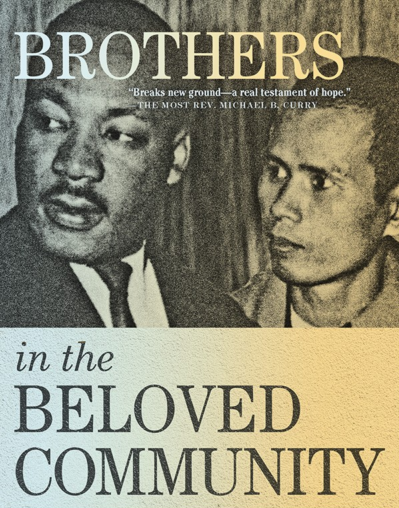
Although Thich Nhat Hanh and Martin Luther King Jr. knew each other for only a few years before Dr. King was assassinated in 1968, their relationship had a profound impact on each other and on the world.
“Country is able to produce King, but cannot preserve King. You have him, and yet you do not have him. I am sorry for you – For all of us. I prayed for him after I learned about his assassination. And then I said to myself: You do not have to pray for him. He does not need it. You have to pray for yourself. We have to pray for ourselves.”
In a letter to a mutual friend, a young Vietnamese Buddhist Monk Thich Nhat Hanh expressed a heartbreakingly accurate and tender assessment of one of the America’s greatest losses when he heard that his friend Dr. Martin Luther King Jr. was assassinated.
Dr. King’s influence on Thich Nhat Hanh and Thich Nhat Hanh’s influence on Dr. King continues to be felt today, perhaps more strongly than ever.
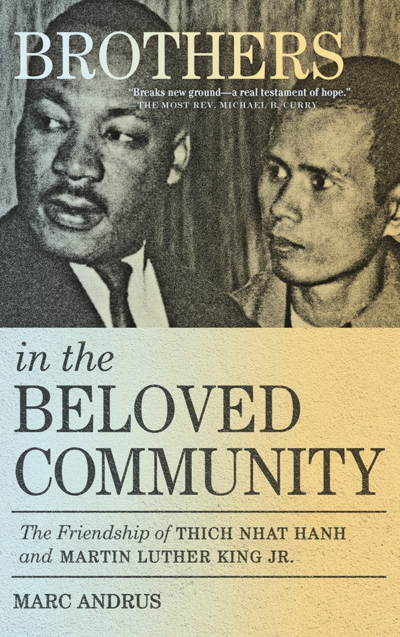 The book ‘Brothers in the Beloved Community’ authored by Dr. Marc Andrus explore a friendship that crossed religions, cultures and war to create a beloved community.
The book ‘Brothers in the Beloved Community’ authored by Dr. Marc Andrus explore a friendship that crossed religions, cultures and war to create a beloved community.
This is the never-before-told story of a friendship between two of the most well-known peace icons of the twentieth century. Although Thich Nhat Hanh and Martin Luther King Jr. knew each other for only a few years before Dr. King was assassinated in 1968, their relationship had a profound impact on each other and on the world.
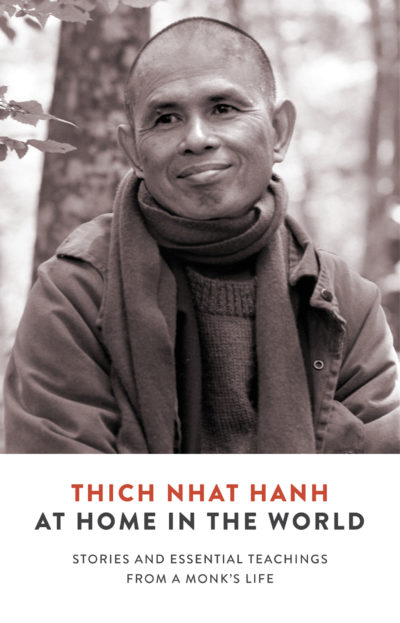 Thich Nhat Hanh wrote an open letter to the Rev. Dr. Martin Luther King Jr. in 1965 as part of his effort to raise awareness and bring peace in Vietnam.
Thich Nhat Hanh wrote an open letter to the Rev. Dr. Martin Luther King Jr. in 1965 as part of his effort to raise awareness and bring peace in Vietnam.
“I first wrote to Dr. King on June 1, 1965, explaining to him why some of us in Vietnam had immolated ourselves in protest against the war. I explained that it was not an act of suicide, or of despair; it was an act of love,” Thich Nhat Hanh wrote.
“There are times when we have no other way than to burn ourselves in order to be heard, in order to get the message across. The people of Vietnam did not want the war, but there was no way for this voice to be heard. The warring parties controlled all the radio, television, and newspapers. To burn ourselves like that was not an act of violence. It was an act of compassion, an act of peace. The suffering of the monk who burns himself to convey a message of love and compassion—is of the same nature as the act of Jesus Christ dying on the cross, dying with no hate, no anger, only with compassion, leaving behind a compassionate call for peace, for brotherhood.”
There was an unexpected outcome of Nhat Hanh’s letter to King: The two men met in 1966 and 1967 and became not only allies in the peace movement, but friends. This friendship between two prophetic figures from different religions and cultures, from countries at war with one another, reached a great depth in a short period of time. Dr. King nominated Thich Nhat Hanh for the Nobel Peace Prize in 1967. He wrote: “Thich Nhat Hanh is a holy man, for he is humble and devout. He is a scholar of immense intellectual capacity. His ideas for peace, if applied, would build a monument to ecumenism, to world brotherhood, to humanity.”
The two men bonded over a vision of the Beloved Community, a concept each knew of because of their membership within the Fellowship of Reconciliation, an international peace organization, and that Martin Luther King Jr. had been popularizing through his work for some time.
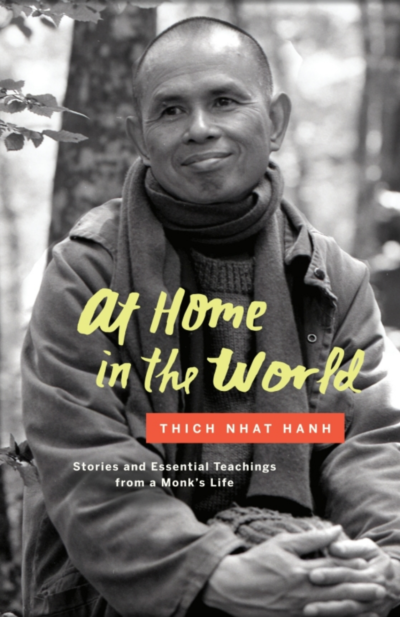 In 2014, forty-six years after King’s assassination on April 4, 1968, Nhat Hanh wrote in his book ‘At Home in the World – Stories and Essential Teachings from a Monk’s Life’:
In 2014, forty-six years after King’s assassination on April 4, 1968, Nhat Hanh wrote in his book ‘At Home in the World – Stories and Essential Teachings from a Monk’s Life’:
“A year later, on June 1, 1966, I met the Reverend Martin Luther King Jr. in person for the first time in Chicago. From the first moment, I knew I was in the presence of a holy person. Not just his good work but his very being was a source of great inspiration for me. When those who represent a spiritual tradition embody the essence of their tradition, just the way they walk, sit, and smile speaks volumes about the tradition. Martin Luther King Jr. was young at that time, as was I. We both belonged to the Fellowship of Reconciliation, an organization working to help groups in conflict find peaceful resolution.
“We had tea together in his room, and then we went down for a press conference. In the press conference, Dr. King spoke out for the first time against the Vietnam War. That was the day we combined our efforts to work for peace in Vietnam and to fight for civil rights in the US. We agreed that the true enemy of man is not man. Our enemy is not outside of us. Our true enemy is the anger, hatred, and discrimination that is found in the hearts and minds of man. We have to identify the real enemy and seek nonviolent ways to remove it. I told the press that his activities for civil rights and human rights were perfectly in accord with our efforts in Vietnam to stop the war.
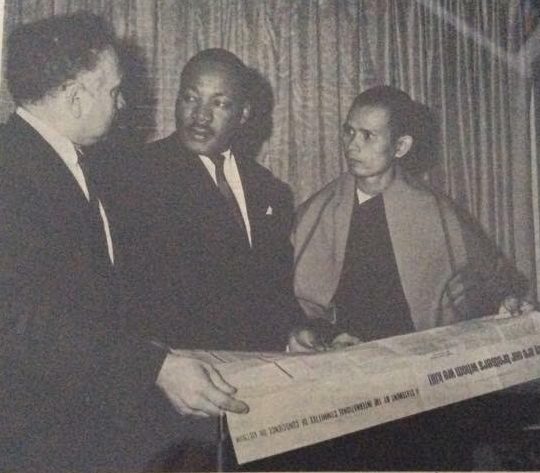
In May 1967, one year later, I met Martin Luther King Jr. again in Geneva at a conference called Pacem in Terris—“Peace on Earth”— organized by the World Council of Churches. Dr. King was staying on the eleventh floor; I was on the fourth floor. He invited me up for breakfast. On my way, I was detained by the press, so I arrived late. He had kept the breakfast warm for me and had waited for me. I greeted him, “Dr. King, Dr. King!”
“Dr. Hanh, Dr. Hanh!” he replied.
We were able to continue our discussion on peace, freedom, and community, and what kind of steps America could take to end the war. And we agreed that without a community, we cannot go very far. Without a happy, harmonious community, we will not be able to realize our dream.
I said to him, “Martin, do you know something? In Vietnam they call you a bodhisattva, an enlightened being trying to awaken other living beings and help them move toward more compassion and understanding.” I’m glad I had the chance to tell him that, because just a few months later he was assassinated in Memphis.
“I was in New York when I heard the news of his assassination; I was devastated. I could not eat; I could not sleep. I made a deep vow to continue building what he called “the beloved community,” not only for myself but for him also. I have done what I promised to Martin Luther King Jr. And I think that I have always felt his support,” Hanh wrote.
In his book the global peace icon shares personal stories, told with his signature simplicity and humor that reveal his most essential teachings.
This collection brings together the core teachings and remarkable autobiographical stories of global peace activist and Zen Master Thich Nhat Hanh. Collected here for the first time are the pivotal moments from his childhood in rural Vietnam, his years as a teenaged novice monk, and his coming-of-age as a teacher standing for peace in a country torn apart by war. Weaving through years of exile and prolific activism, Thich Nhat Hanh reveals an astounding journey in which his true home remains in the here and now.
This deeply personal collection, selected and told with care, teaches in a tradition that goes back to the time of the Buddha. On his eightieth birthday, when asked if he planned to retire, Thich Nhat Hanh said: “Teaching is not done by talking alone. It is done by how you live your life. My life is my teaching. My life is my message.”
The new book ‘In Brothers in the Beloved Community’ Marc Andrus also tells the little-known story of a friendship between two giants of our time.
______________________
Source: Plum Village, Parallax